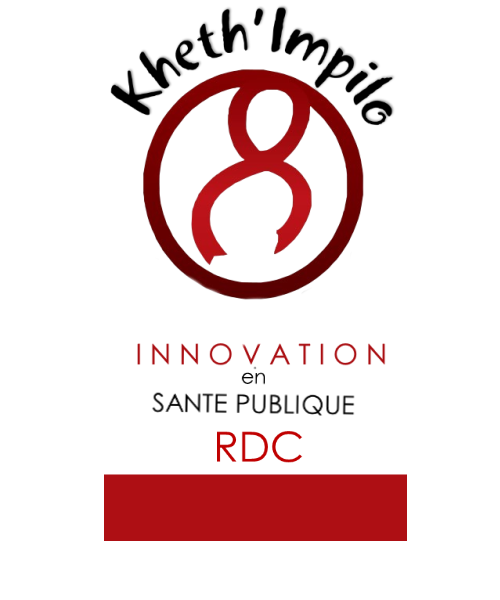INTERVENTION APPROACHES AND STRATEGIES
Inspired by the principles of the coaching and mentoring approach, KI-RDC plans to set up a coaching system in a professional community to work on solving economic system problems and the Systems Strengthening Accelerator to test a new way of working on the development of a new system. A technical assistance approach that connects experts from different fields to collaborate, mentor and engage with community members on an on-going basis.
The coaching and mentoring community will be composed of a group of experts committed to the development of a technical assistance approach only in different areas, to share their experiences with the members of the group and contribute to the collective acquisition of skills and knowledge. The community-based approach to coaching and mentoring aims to be recognized as an expert in solving economic system challenges. The coaching and mentoring initiative will establish an open database that aims to establish groups dedicated to how technical assistance is delivered, who receive orientation training, make presentations and benefit from capacity development opportunities.
In Management
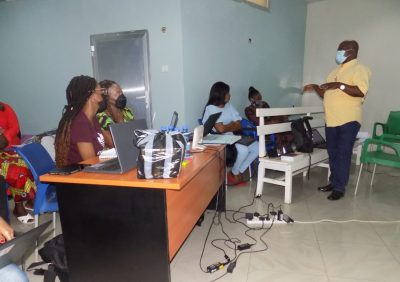
In the implementation of community activities, KI-RDC participates in the supervision of community-based organizations in the improvement not only of their technical performance, but also of their administrative, organizational and financial and administrative management systems. To date, KI-RDC is supporting the community-based organization LAMUKA based in Fungurme in the province of Lualaba with this approach.
KI-DRC also works to conduct applied research in the use of modern technological means to improve the quality of community and primary health services as well as the empowerment of community microfinance groups (software as a social service, SaaS).
For example, KI-RDC is introducing advanced, easy-to-use software in the support of OVCs and the monitoring of cash flows in savings groups.
In Auditing
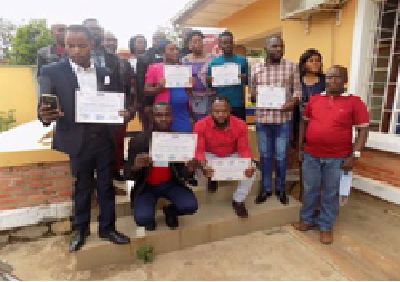
In auditing for management control, the implementation of improvement processes is necessary within a company For this reason, KI-RDC regularly organizes internal audit, which is an essential activity in a process of progress of the company, this allows us to support our components and achieve our objectives according to the needs and available resources.
In Training
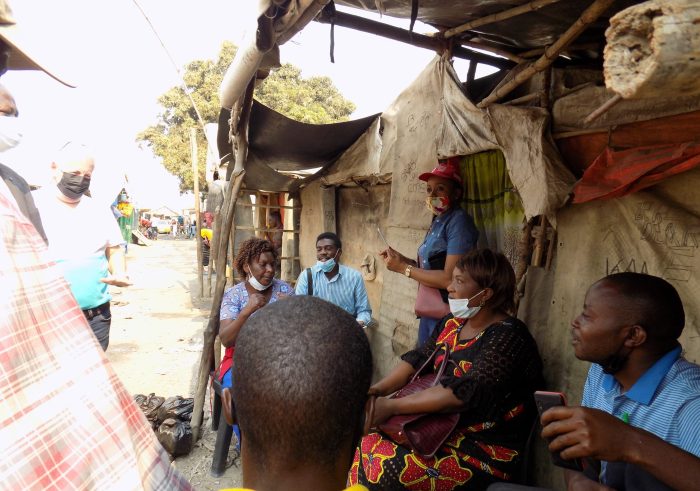
KI-RDC regularly organizes training and supervision of community agents as well as service providers in the 77 FOSAs it supports and their satellites. Since the beginning of the HEC project, KI-DRC has conducted at least fifty training courses in the 14 Health Zones of the province of Lualaba.
One of these trainings is the case conference, which is a meeting of the stakeholders of the various health and social services at the level of the Manika health zone, aimed not only at informing other stakeholders about what is being done on the ground by our community workers, but also and above all at involving everyone in these activities in order to encourage a holistic intervention, for an appropriate response to all the needs expressed by this category of people in our communities.
AREAS OF INTERVENTION
In Public Health
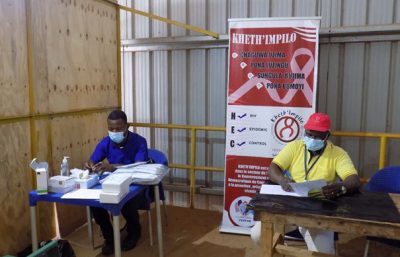
KI-DRC supports the Government of the DRC in achieving its objectives of scaling up quality services for the management of HIV/AIDS in the primary health care sector, as outlined in the national strategic plan, with PEPFAR/USAID funding of at least $10,000,000 since 2019 for the implementation of the HEC (HIV EPIDEMIC CONTROL) project in the 14 Zones of the Province of Lualaba with 77 health
facilities (FOSA). This support includes prevention, care for people living with HIV (PLHIV), support for orphans and vulnerable children (OVCs) and community microfinance. In particular with the OVC programme, the project aims to achieve three main objectives:
i. Strengthening the links between health and social services and
ii. Strengthening the social protection system through
iii. Capacity building for government, community-based organizations and civil society.
It is clear that the child and the household remain the main areas of interest through which the various activities are implemented and for which Field Agents are pillars to ensure that the project’s interventions are adequate in relation to the needs of the OVCs and their households.
In Wash
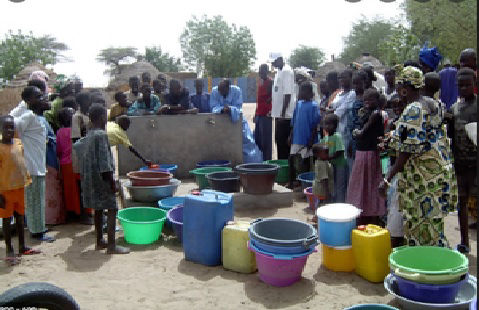
Access to clean water is a vital need. Environmental sanitation through hygiene improvement measures to minimize the spread of communicable diseases. KI-DRC is seeking funding to assist rural communities in the provinces of Lualaba, Kasai, Kivus and other provinces in the DRC.
In Agribusiness
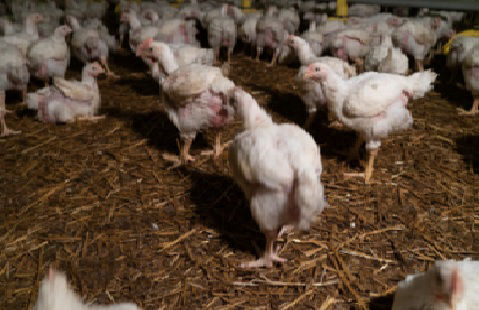
This project aims to improve employment and business creation opportunities in the agricultural sector for thousands of vulnerable individuals and households.
The project will have as direct beneficiaries 150 women’s and young men’s groups, many of them led by women, bringing together a total of more than 150 small agribusinesses and about 100 youth.
It will aim to promote the creation of innovative, attractive and sustainable jobs for young men and women by providing them with training, coaching and coaching to develop the entrepreneurial and business skills they need to create and manage successful agricultural businesses. The initial focus will be on the agricultural fishery products sector.
Agriculture is the backbone of a country’s economy, so the project will not only focus on capacity building. The project will also help identify market opportunities and high value-added activities. Professional agricultural organizations and incubators will play a key role in supporting future farmers and incubating emerging agribusinesses. Through the project, youth groups with the most promising ideas will receive grants and additional support to help them commercialize their ideas. Digitalization will be one of the key themes of the project, which will support the integration of digital solutions into business activities.
In Education
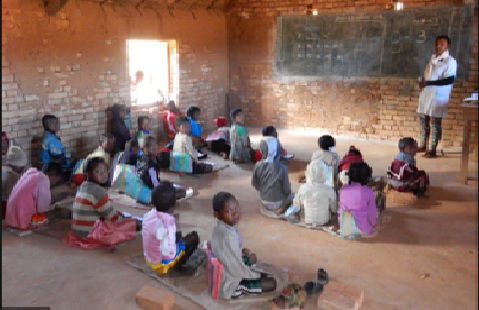
The Convention on the Rights of the Child (CRC) specifies in Article 28 that the right of the child to education must be ensured on the “basis of equality of opportunity”. This is also reflected in Goal 4 of the Sustainable Development Goals (SDGs). Unfortunately, children in certain regions, particularly rural areas, isolated areas or children living in slums, do not always enjoy the same conditions of access to education, despite the universal free primary education in the DRC.
Thus, KI-RDC assists these often neglected children by relying on their resilience to build a bridge between non-formal school and the formal education system as well as promote the professional integration of adolescents. This is a continuation of the supervision of the OVCs with the provision of the necessary supplies for their schooling, support for their enrolment in public schools as well as the monitoring of their academic progress each quarter.
In Community Microfinance
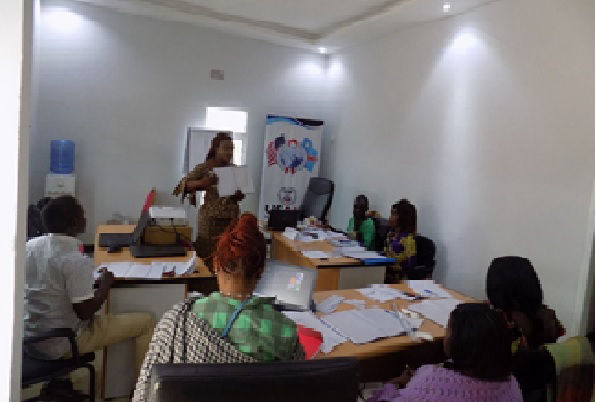
KI-DRC supervises community members selected according to a criterion of socio-economic vulnerability following the following objectives:
i. Financial self-determination
- Learning how to manage activities that generate financial income.
The methodology used is to group the beneficiaries into groups of men and women ranging from 15 to 30 people who save regularly, then borrow from their savings and repay with interest of 10%, which generates profits on their savings when sharing dividends ranging from 60 to 70%, that no current bank can produce. Not to mention their contributions to the solidarity fund which allows them to help each other in certain unforeseeable circumstances. Capacity-building sessions are offered by an incubator of mentors in the field of financial education and entrepreneurship. This program covers the entire province of Lualaba in the 14 health zones, the details of which are listed in the table below:
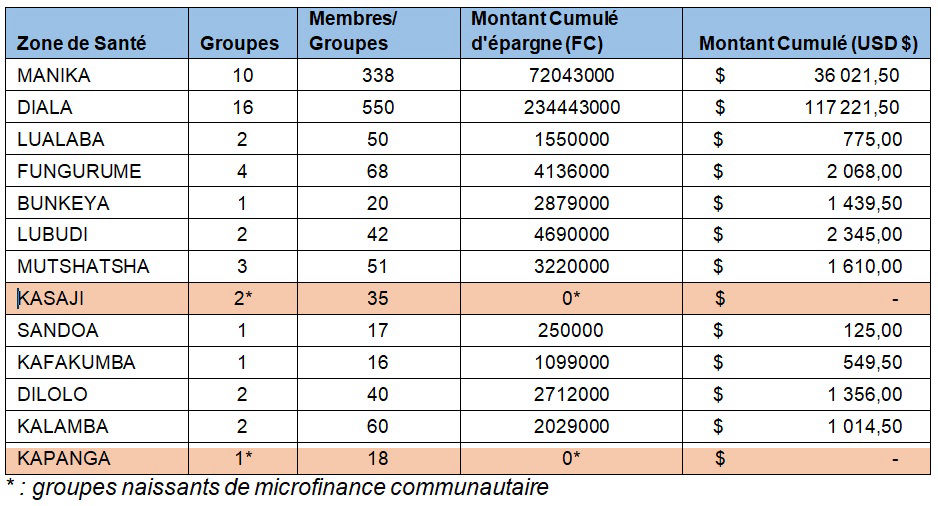
In Governance
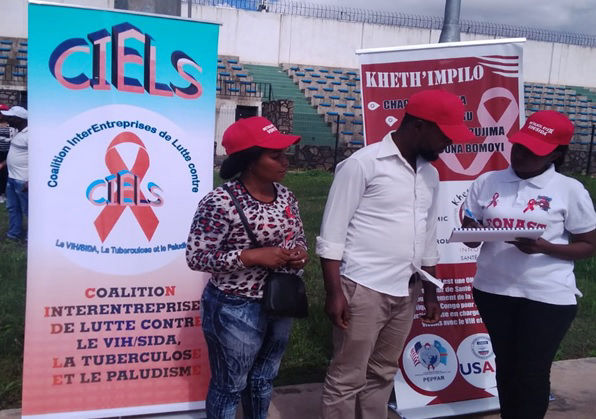
KI provides support to the Ministry of Public Health for the strengthening of governance and the health system, particularly through technical and institutional support in the context of decentralization to guarantee the supply and use of quality health services. KI supports the implementation of sector policies and strategies, standards and guidelines, as well as the strengthening of health sector coordination and intersectoral collaboration.
At the level of the province of Lualaba, KI provides technical and institutional support to the management teams of all 14 health zones, the national HIV control programme and the Provincial Health Division. This support in terms of operating costs, supervision and communication missions allows these coordination structures to support health policy in the province and offer quality services both at the level of health facilities and in the community for the well-being of the population.
In addition, KI plans to support the provincial consultation framework that will bring together all the steering bodies of the province’s health system, both public and private, on a quarterly basis with a view to joint planning of activities, proper monitoring of implementation as well as evaluation of the province’s activities in order to contribute to good governance in the health sector in the DRC.
In Economic Empowerment

Strengthening the economic empowerment of women and young men is a prerequisite for achieving sustainable development and pro-poor growth and for the achievement of all investors. Through collective action, women’s associations can directly reach out to relevant public and private organizations and request institutional support for women’s income-generating activities.
They have the means to negotiate collective loans and micro-leasing services for their members, and to act constructively on the economic opportunities available to them. Several donors are supporting initiatives aimed at strengthening the possibilities and means for women to organize, form associations and act collectively to defend their common interests. “We emphasize that commitment to women and girls has a multiplier effect on productivity and efficiency and sustains economic growth” (paragraph 54 of the United Nations (2010). Aimed at empowering women economically through entrepreneurship.

CALL
+243(0) 81 843 0369
Coordonnées de la carte
-4,312296, 15,272494
Reception.RDC@khethimpilo.org
